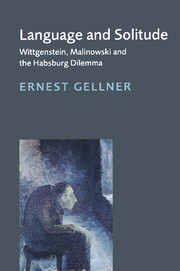Preface
Published online by Cambridge University Press: 05 March 2010
Summary
My father left two unpublished book-length manuscripts when, on 5 November 1995, he died in his flat at the Central European University, Prague. One manuscript required relatively little work and was published by Weidenfeld in 1997 as Nationalism. This is the other.
This book is in many ways a fitting – almost autobiographical – last work. In the first place, it brings together themes that he worked on throughout his academic career, from Words and Things, the attack on Wittgensteinianism that made his name in 1959, through Nations and Nationalism (1983) and Nationalism (1997), to studies of the development of his adopted discipline, social anthropology, and in particular the canonical place of Bronislaw Malinowski within it (published in various articles over the years). But in the second place, the Habsburg social background to the thought of Wittgenstein and Malinowski that he describes here was also his own background, or, strictly, that of his father. The choice that faced Wittgenstein and Malinowski was also the choice that faced every member of his family. On both sides my father was descended from secularised, German-speaking Jews, as was common in Bohemia, though less so further east in Poland. His grandfather was a loyal subject of Franz Josef who had nine children. The men became lawyers, doctors, even, in one case, a theatre director. One of his aunts was an active Zionist. His father, Rudolf, went to Berlin to study history and sociology the year after Max Weber died. Later he studied in Paris and made some money by writing for German newspapers.
- Type
- Chapter
- Information
- Language and SolitudeWittgenstein, Malinowski and the Habsburg Dilemma, pp. vii - xiiPublisher: Cambridge University PressPrint publication year: 1998
- 3
- Cited by



